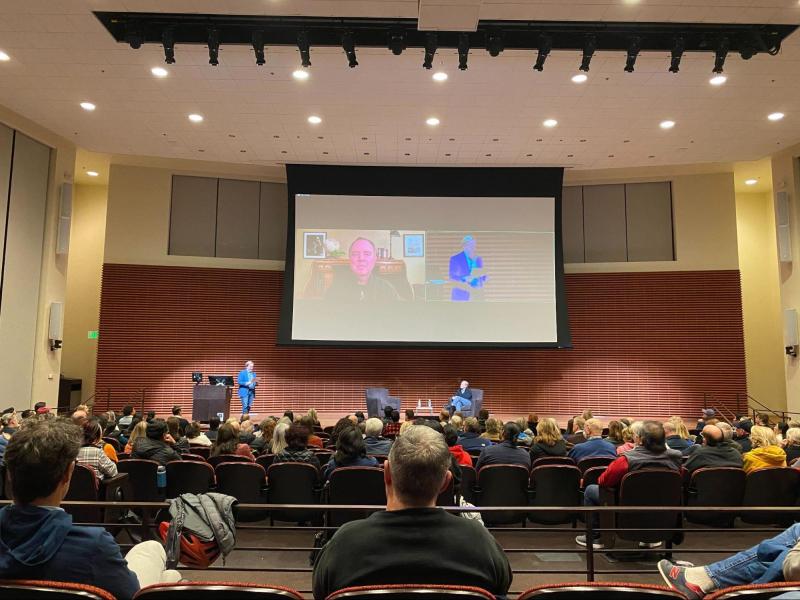Congressional representatives in conversation with Stanford academics stressed the importance of the 2024 elections for American democracy at a Monday talk at Cemex Auditorium.
“The 2024 election will be the most important since 1860,” said Michael McFaul, director of the Freeman Spogli Institute for International Studies.
The panel was part of a speaker series for COMM 159B: “Shaping America’s Future: Exploring the Key Issues on Our Path to the 2024 Elections.” Moderated by Common Sense Media CEO and Stanford professor James Steyer, the talk featured Senator Amy Klobuchar and U.S. House representative Adam Schiff, who both shared strong concerns about the current state of American democracy.
“Democracy around the world is fragile and … the U.S. is deeply divided right now, driven by forces predating Donald Trump,” Schiff said, pointing out the rise in a propensity for political violence and the accelerating trend towards autocracy.
Schiff said he remains skeptical of the “durability of institutions,” pointing to Trump’s claims of election fraud and incitement of the Jan. 6 insurrection. He also referenced China’s exploitation of images of the Jan. 6 attack on Capitol Hill to promote its own political model, impacting the U.S.’s ability to preserve democracy both at home and abroad.
McFaul painted a more optimistic picture, highlighting the broader perspective that there are “more democracies in the world than [in] any timeframe.” Recalling past challenges against fascism and communism, he argued that the democratic system is more resilient than expected.
They both agreed, however, that there is a sustained political deterioration in the U.S. McFaul said that the U.S. started on a “democratic recession” even before Trump’s tenure.
Three big factors accounted for the current democratic crisis, according to McFaul: the rise of autocracy in states like China and Iran, a misplaced hope for democratic breakthroughs as seen during the Arab Spring and after the collapse of U.S.S.R. and the internal erosion of liberal democracies, driven by populism.
The speakers also debated the Israel-Gaza war, reaching no consensus on how it will evolve. Schiff said the U.S. has “done a good job containing the war from becoming a wider conflict,” but that it is difficult to foresee how the war ends.
The U.S.’s primary goal should be “to support Israel in its right to defend itself while urging them to minimize civilian casualties,” Schiff said.
McFaul added that a potential two-state solution is more of a long term project, and the immediate concern is to secure the safe release of hostages.
Both agreed that the U.S. should support Ukraine in its ongoing war with Russia and that doing so would promote democracy overseas in general. McFaul said Russian President Vladimir Putin currently has no incentive to negotiate because of Trump’s potential return to the White House, and that the U.S. election is therefore linked directly to Ukraine’s future.
“What signal will it send to Xi Jinping if we don’t fight for a democratic country in Europe?” McFaul said.
According to McFaul, failing to take decisive action in Ukraine will accelerate Xi’s militaristic actions on Taiwan. “If you need to avert war, help Ukraine.”
Klobuchar said that American democracy is “fragile but resilient,” arguing that democracy prevailed despite the Jan. 6 assault. She said that AI “could be a negative force if we let it be,” and advocated for setting guardrails to curtail fake ads, pointing to her own legislative efforts to regulate artificial intelligence for the 2024 elections.
McFaul shared that Russian operatives impersonated him in a Zoom meeting with top Ukrainian dignitaries. He expressed alarm at foreign actors’ more frequent use of deepfakes to undermine U.S. diplomatic efforts.
The talk ended on a high note as all three speakers affirmed their belief in the ability of young people to inspire positive political change.
Klobuchar expressed pride in this generation’s resilience in overcoming the pandemic. She added that this generation is “old enough to realize the chaos Trump brings.”
Echoing Klobuchar, Schiff said that “young people are impatient in the best of ways,” especially in the face of bigotry.
Klobuchar closed by reading from a favorite speech of hers: “Despite America not always living up to its ideals, at least it had ideals.”
